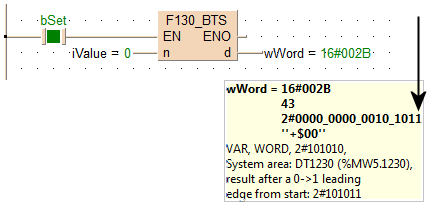


 F130_BTS
F130_BTS16-bit data bit set
Turns ON the bit specified by the bit position at n of the 16-bit data specified by d if the trigger EN is in the ON-state. Bits other than the bit specified do not change. The range of n is 0 to 15.

Input
16-bit area
Output
Specifies bit position to be set

All input and output variables used for programming this function have been declared in the POU header. The same POU header is used for all programming languages.

VAR
bSet: BOOL:=FALSE;
(*activates the function*)
iValue: INT:=0;
(*bit position*)
wWord: WORD:=2#101010;
(*result after a 0->1 leading
edge from start: 2#101011*)
END_VARWhen the variable bSet is set to TRUE, the function is carried out. The bit on position 0 is set to 1.


BODY
WORKSPACE
NETWORK_LIST_TYPE := NWTYPELD ;
ACTIVE_NETWORK := 0 ;
END_WORKSPACE
NET_WORK
NETWORK_TYPE := NWTYPELD ;
NETWORK_LABEL := ;
NETWORK_TITLE := ;
NETWORK_HEIGHT := 5 ;
NETWORK_BODY
B(B_CONTACT,,bSet,3,1,5,3,);
B(B_VARIN,,iValue,8,2,10,4,);
B(B_VAROUT,,wWord,16,2,18,4,);
B(B_F,F130_BTS!,,10,0,16,4,,?DEN?Dn?AENO?Cd);
L(5,2,10,2);
L(1,2,3,2);
L(1,0,1,5);
END_NETWORK_BODY
END_NET_WORK
END_BODY
IF bSet then
F130_BTS( n:= iValue,
d=> wWord);
END_IF;LD |
start |
(* EN = start; Starting signal for the F130_BTS function. *) |
F130_BTS |
output_value, |
(* n = output_value *) |
0 |
(* d = bit number, here 0 *) |
|
ST |
out |
(* optional *) |